 Petzlover
Petzlover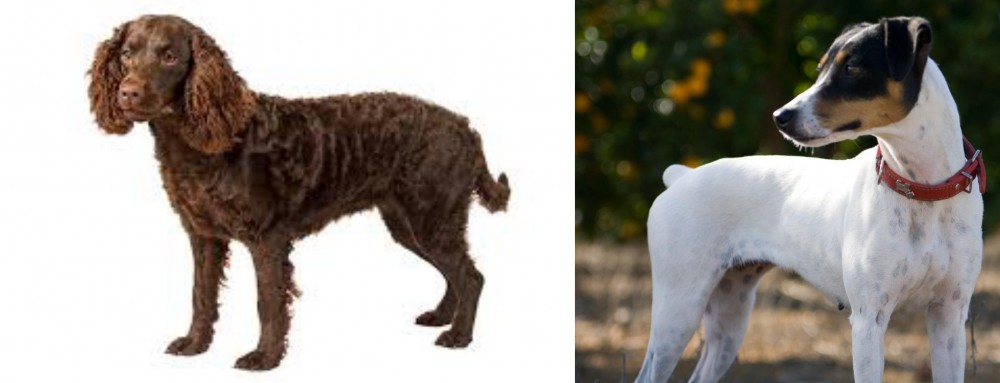 American Water Spaniel is originated from United States but Ratonero Bodeguero Andaluz is originated from Spain. Both American Water Spaniel and Ratonero Bodeguero Andaluz are having almost same height. American Water Spaniel may weigh 11 kg / 25 pounds more than Ratonero Bodeguero Andaluz. American Water Spaniel may live 4 years less than Ratonero Bodeguero Andaluz. Both American Water Spaniel and Ratonero Bodeguero Andaluz has almost same litter size. American Water Spaniel requires Moderate Maintenance. But Ratonero Bodeguero Andaluz requires Low Maintenance
American Water Spaniel is originated from United States but Ratonero Bodeguero Andaluz is originated from Spain. Both American Water Spaniel and Ratonero Bodeguero Andaluz are having almost same height. American Water Spaniel may weigh 11 kg / 25 pounds more than Ratonero Bodeguero Andaluz. American Water Spaniel may live 4 years less than Ratonero Bodeguero Andaluz. Both American Water Spaniel and Ratonero Bodeguero Andaluz has almost same litter size. American Water Spaniel requires Moderate Maintenance. But Ratonero Bodeguero Andaluz requires Low Maintenance
 The American Water Spaniel was developed in the United States. He is the state dog of Wisconsin and was developed there in the 19th century. The bloodlines of this spaniel are varied but certainly include the English Water Spaniel and the Irish Water Spaniel. Even though they are the state dog of Wisconsin they were almost extinct when Dr. Fred J. Pfeifer rescued the breed. The numbers had fallen after World War II because hunting was now a recreational sport and not needed to provide food for the family. He then started a breed club and wrote a breed standard, both of which were recognized by the United Kennel Club and the American Kennel Club.
When first developed the American Water Spaniel was known as the American Brown Spaniel. It was bred with a curly, thick coat so that it cold be sustained in Wisconsin winters and cold water. It was bred to hunt grouse, water fowl and prairie chickens as well as furry land animals. Pfeifer advertised his dogs for sale everywhere using a mailer that read: “, "The American Brown Spaniel is distinctively an American production. Hunters have known this type for years and it was through their efforts that this dog was propagated.... For years we have bred only selective stock, breeding for gameness, stability, courage, intelligence, and beauty. They are dogs to admire and trust under all conditions whether in the home circle or in the field with the outdoor man."[2]
The American Water Spaniel was developed in the United States. He is the state dog of Wisconsin and was developed there in the 19th century. The bloodlines of this spaniel are varied but certainly include the English Water Spaniel and the Irish Water Spaniel. Even though they are the state dog of Wisconsin they were almost extinct when Dr. Fred J. Pfeifer rescued the breed. The numbers had fallen after World War II because hunting was now a recreational sport and not needed to provide food for the family. He then started a breed club and wrote a breed standard, both of which were recognized by the United Kennel Club and the American Kennel Club.
When first developed the American Water Spaniel was known as the American Brown Spaniel. It was bred with a curly, thick coat so that it cold be sustained in Wisconsin winters and cold water. It was bred to hunt grouse, water fowl and prairie chickens as well as furry land animals. Pfeifer advertised his dogs for sale everywhere using a mailer that read: “, "The American Brown Spaniel is distinctively an American production. Hunters have known this type for years and it was through their efforts that this dog was propagated.... For years we have bred only selective stock, breeding for gameness, stability, courage, intelligence, and beauty. They are dogs to admire and trust under all conditions whether in the home circle or in the field with the outdoor man."[2]
In Wisconsin, around the wolf River and the Fox River, hunters were looking for a water dog that could also hunt on land. They needed a dog that could work a variety of fowl and game but who was small enough for a skiff and strong enough for the artic water temperatures of Wisconsin in the Winter. So, in addition to the spaniels named above, other breeds such as the Curly Coated Retriever, the Poodle, Native Indian dogs and the Sussex Spaniel were intermixed. When first developed the American Water Spaniel was known as the American Brown Spaniel. It was bred with a curly, thick coat so that it cold be sustained in Wisconsin winters and cold water. It was bred to hunt grouse, water fowl and prairie chickens as well as furry land animals. The American Water Spaniel was then itself used to develop another new breed, the Boykin Spaniel. In 1985 Wisconsin declared the American Water Spaniel to be the official state dog. Even so there remain only a few thousand dogs in existence. Though recognized by the AKC, they are neither spaniels nor retrievers and remain unclassified. Because of this they cannot compete in AKC field trials, but they do compete in AKC hunt tests. Though rare, the American Water Spaniel is a great hunting dog, retriever and companion.
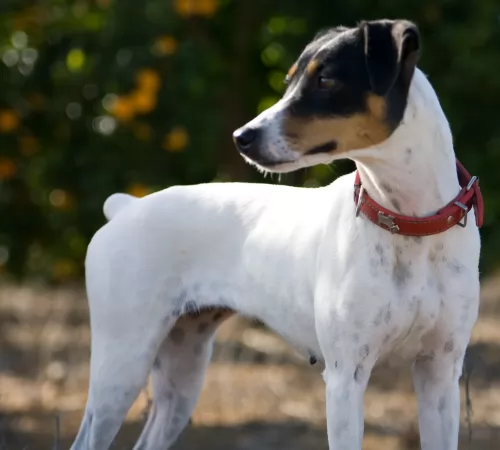 Long ago the English visited Spain to sample their wines, bringing with them smooth coated English Fox Terriers which were later crossed with other dog breeds of the area.
Long ago the English visited Spain to sample their wines, bringing with them smooth coated English Fox Terriers which were later crossed with other dog breeds of the area.
It is believed that the Andalusia Ratter’s ancestors were smooth coated fox terriers. The Club Nacional del Perro Andaluz Ratonero Bodeguero was established and in 1993 a standard for the breed was set.
It is only fairly recently that the breed was recognized by the Royal Canine Society of Spain but it isn’t recognized by any of the major kennel clubs.
 The American Water spaniel is a midsized, muscular dog. There is nothing flashy about his looks or his work performance. He is however a consistent, competent swimmer and hunter. His brown coat is wavy or tightly curled, waterproof and dense. His feet have thick pads and webbed toes. The AWS is intelligent, happy, and easy going. He is a very versatile hunting dog on land and in water. The breed has not changed much since it originated in the 19th century. They can be liver, chocolate or brown. The eyes should be the same as the color of the coat. They have broad skulls with wide, long ears and an undocked tail.
The American Water spaniel is a midsized, muscular dog. There is nothing flashy about his looks or his work performance. He is however a consistent, competent swimmer and hunter. His brown coat is wavy or tightly curled, waterproof and dense. His feet have thick pads and webbed toes. The AWS is intelligent, happy, and easy going. He is a very versatile hunting dog on land and in water. The breed has not changed much since it originated in the 19th century. They can be liver, chocolate or brown. The eyes should be the same as the color of the coat. They have broad skulls with wide, long ears and an undocked tail.
They have a square, medium sized muzzle and wide nose. They have a bite that is level or scissors. The legs of the muscular American Water Spaniel are medium in length and the tail is full, with a medium length, curved and feathered. The dewclaws might or might not be removed.
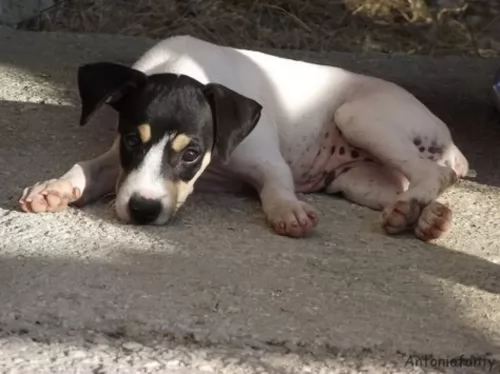 Also known as the Spanish Jack Russell, the Ratonero Bodeguero Andaluz looks very similar to this popular Jack Russell Terrier.
Also known as the Spanish Jack Russell, the Ratonero Bodeguero Andaluz looks very similar to this popular Jack Russell Terrier.
He is a small to medium sized dog with a lean, muscular body. The Ratonero developed in the south of Spain and is thought to be a mix of local ratting dogs and Fox Terriers. This ensured a quick, agile hunter.
The dog stands at between 35 – 43cm in height and weighs 6 - 9kg. The dog’s head is fairly small with dark brown eyes and half erect-half floppy ears. The coat is mainly white with some freckling. It is short and smooth with shades of black and tan covering the facial area. Some of these dogs are born with a natural bob-tail.
These dogs are known to have robust, hearty, happy personalities, full of the joys of living. They get on well with children as well as other pets if they have grown up with them.
Introductions should be slow if one of these dogs are brought into a home where there are already other pets. He is a very active breed and will be requiring plenty of mental stimulation and physical exercise.
They can provide quite a bit of entertainment for their human families as they can become quite clownish. They’re the kind of dogs that can adapt to life in the countryside or the city.
 Bred to work the American Water Spaniels are loyal to their people, want to please them, but are not so great with strangers. They are stubborn and love to be the center of attention. They are often one person or one family dogs. They need an owner who is the pack leader and willing to put in the time to train them. However, they are a versatile breed and need variety in training and activities rather than repetitive activities. They are prone to resource guarding, slow maturation and dominance. These negative traits are dissipated with a strong leader, good training and a lot of daily activity. They are sensitive as well as stubborn. Do not use a punishment-oriented training with them. They will respond out of love and loyalty or not at all. This is a breed that wants to be the alpha over the people and will do so if you let him. Keep them fenced as being hunters they love to wander and will leave home whenever they can.
Bred to work the American Water Spaniels are loyal to their people, want to please them, but are not so great with strangers. They are stubborn and love to be the center of attention. They are often one person or one family dogs. They need an owner who is the pack leader and willing to put in the time to train them. However, they are a versatile breed and need variety in training and activities rather than repetitive activities. They are prone to resource guarding, slow maturation and dominance. These negative traits are dissipated with a strong leader, good training and a lot of daily activity. They are sensitive as well as stubborn. Do not use a punishment-oriented training with them. They will respond out of love and loyalty or not at all. This is a breed that wants to be the alpha over the people and will do so if you let him. Keep them fenced as being hunters they love to wander and will leave home whenever they can.
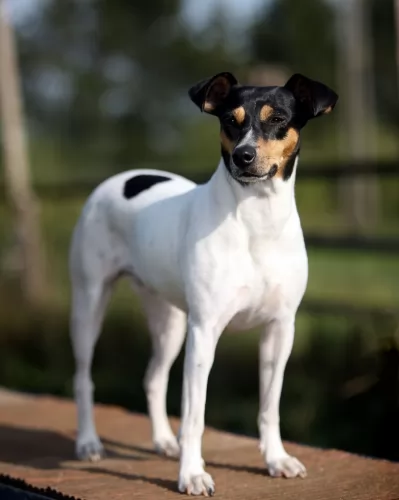 Your Ratonero Bodeguero Andaluz to this day is a ratter, always alert and ready to spring on prey. He is always lively and friendly, and with his loving nature, makes a splendid companion for his human family.
Your Ratonero Bodeguero Andaluz to this day is a ratter, always alert and ready to spring on prey. He is always lively and friendly, and with his loving nature, makes a splendid companion for his human family.
He is also a stubborn dog, liking to go his own way, and therefore will require training and socialization. He is an adaptable little dog too and when you bring him into your home he is willing to adapt to your way of life and become a loyal and loving member of your family.
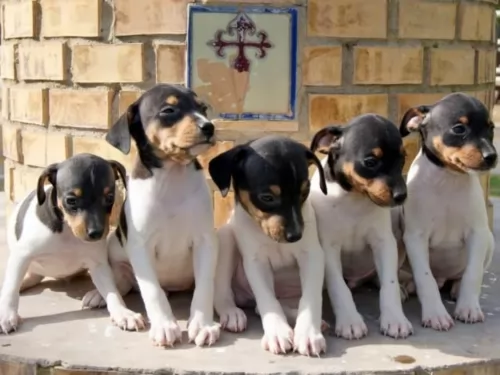 With good care, your Andalusian Ratter isn’t likely to get sick, but still, you would be better off knowing about some of the common dog diseases your pet could get.
With good care, your Andalusian Ratter isn’t likely to get sick, but still, you would be better off knowing about some of the common dog diseases your pet could get.
This is usually seen in young dogs where there is lameness in the hind legs and hip pain. It is believed that Legge Perthe’s occurs because of a genetic predisposition, and when it develops, there is sadly no cure.
Skin infections may seem fairly mild but nothing can be further from the truth. They can be painful and frustrating. Skin redness, dryness, itchiness and pain can cause your pet to lick and bite and make the situation worse. If your pet is being driven crazy by a skin irritation, get him to the vet who will do a complete physical examination.
Other diseases to be aware of include hip dysplasia, obesity, epilepsy and bloat.
 Feeding the American Water Spaniel is no mystery. They need a high quality dry dog food with an eye toward calorie consumption. Some AWS have a tendency to become obese. Treats are important to the AWS in training but can add to the obesity concerns.
Feeding the American Water Spaniel is no mystery. They need a high quality dry dog food with an eye toward calorie consumption. Some AWS have a tendency to become obese. Treats are important to the AWS in training but can add to the obesity concerns.
Like other isolated breeds that were bred true, the genetic issues we see in many other popular breeds are not seen as much in the American Water Spaniel. They do however have a few issues to contend with.
Eyes: These issues appear to be inherited with progressive retinal atrophy and cataracts. Many AWS that develop cataracts do so at a very young age, usually under a year. Metabolic: Diabetes, hypothyroidism, glandular disorders and epilepsy. Baldness and Cardiac Issues. Orthopedic: Hip dysplasia. There is no evidence to suggest any elbow dysplasia. Additional concerns are hypothyroidism, allergies, epilepsy, diabetes and glandular disorders which Of course, the American Water Spaniel is an athlete who loves to be outdoors. He loves to swim, run and hunt. He needs daily exercise, or he can become loud and destructive. They thrive on having a job and they are not happy if they don’t have one. They are good at agility, obedience, dock diving and field trials. They also enjoy flyball and barn hunt.
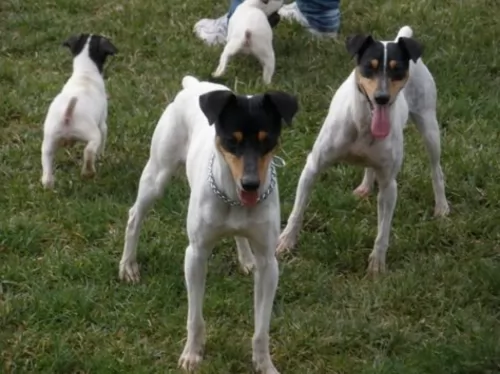 This is a fairly low maintenance dog as the short smooth coat will be easy to brush twice a week.
This is a fairly low maintenance dog as the short smooth coat will be easy to brush twice a week.
Check him over for unusual lumps, trim his nails and check inside his ears, look into his eyes to ensure they are bright and alert and look inside his mouth to make sure he doesn’t have any rotten teeth.
Have your pet neutered or spayed if you want to avoid puppies. This can be beneficial for your pet’s health too.
Feed your Ratonero Bodeguero Andaluz only the best food there is. If you opt for commercially manufactured food, make sure its full of vitamins and minerals. Your little pet will want consistency and simplicity with his food to avoid digestive problems.
Try and provide him with some home-made food which can be added to the dry kibble twice a week as a treat. Boiled chicken, brown rice or pasta and spinach, sweet potatoes and carrots all chopped up ad mixed into the dry kibble will ensure your pet’s health.
Some raw meat added in occasionally will also go towards ensuring his good health.
Always make sure he has access to fresh, cool water.
Provide him with a safe, dry, warm, comfortable place to sleep.
Get him to the vet when you see he is sick.
Ensure he has sun and shade in the garden.
Never ever leave him in a hot car.